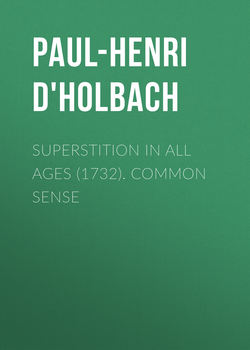Читать книгу Superstition In All Ages (1732). Common Sense - Paul-Henri d'Holbach - Страница 55
COMMON SENSE
LII. – WHAT IS CALLED PROVIDENCE IS BUT A WORD VOID OF SENSE
ОглавлениеWe call Providence the generous care which Divinity shows in providing for our needs, and in watching over the happiness of its beloved creatures. But, as soon as we look around, we find that God provides for nothing. Providence neglects the greatest part of the inhabitants of this world. Against a very small number of men, who are supposed to be happy, what a multitude of miserable ones are groaning beneath oppression, and languishing in misery! Whole nations are compelled to starve in order to indulge the extravagances of a few morose tyrants, who are no happier than the slaves whom they oppress! At the same time that our philosophers energetically parade the bounties of Providence, and exhort us to place confidence in it, do we not see them cry out at unforeseen catastrophes, by which Providence plays with the vain projects of men; do we not see that it overthrows their designs, laughs at their efforts, and that its profound wisdom pleases itself in misleading mortals? But how can we place confidence in a malicious Providence which laughs at and sports with mankind? How can I admire the unknown course of a hidden wisdom whose manner of acting is inexplicable to me? Judge it by its effects! you will say; it is by these I do judge it, and I find that these effects are sometimes useful and sometimes injurious to me.
We think to justify Providence by saying, that in this world there are more blessings than evil for each individual man. Let us suppose that the blessings which this Providence makes us enjoy are as one hundred, and that the evils are as ten per cent.; would it not always result that against these hundred degrees of goodness, Providence possesses a tenth degree of malignity? – which is incompatible with the perfection we suppose it to have.
All the books are filled with the most flattering praises of Providence, whose attentive care is extolled; it would seem to us, as if in order to live happy here below, man would have no need of exerting himself. However, without labor, man could scarcely live a day. In order to live, I see him obliged to sweat, work, hunt, fish, toil without relaxation; without these secondary causes, the First Cause (at least in the majority of countries) could provide for none of his needs. If I examine all parts of this globe, I see the uncivilized as well as the civilized man in a perpetual struggle with Providence; he is compelled to ward off the blows which it sends in the form of hurricanes, tempests, frost, hail, inundations, sterility, and the divers accidents which so often render all their labors useless. In a word, I see the human race continually occupied in protecting itself from the wicked tricks of this Providence, which is said to be busy with the care of their happiness. A devotee admired Divine Providence for having wisely made rivers to flow through all the places where men had built large cities. Is not this man's way of reasoning as sensible as that of many learned men who do not cease from telling us of Final Causes, or who pretend to perceive clearly the benevolent views of God in the formation of things?
